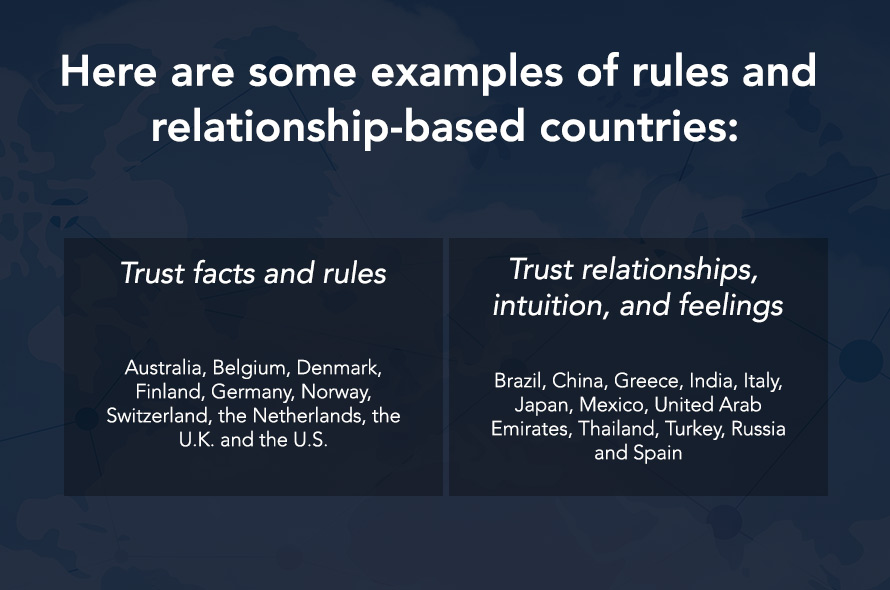Canada has an outstanding reputation for welcoming new citizens from diverse backgrounds. Global investors appreciate this open-minded viewpoint, which can give Canadian REALTORS® an advantage over their colleagues to the south.
No matter their ethnic background, home buyers want to work with a real estate professional they can trust to have their best interests at heart. But how do you establish that trust?
Building trust with global prospects
Investors in transactional countries like the United States, Germany, and the United Kingdom are generally comfortable doing business with strangers, if you have a sound reputation, provide solid research, and stick to their price range. These home buyers put their trust in facts, rules, and regulations.
At the other end of the spectrum are cultures that value relationships. These home buyers need to know you, like you, or be related to you in order to trust you. Cultures that trust in relationships, intuition, and feelings include much of Asia, Latin America, the Middle East and Africa.

Since many Asian cultures are generally collectivistic (where decisions are made by a group) REALTORS® who build relationships with Chinese, Indian, or Filipino families can develop enormous networks of referrals. Building trust with these relationship-based, collectivistic buyers takes more time–but it pays off.
Communication styles
Another major consideration is the communication style of your prospect.
Sometimes we encounter difficulties communicating within our own families. Add in different languages, cultural traditions, body language, and perceptions of time–many of us can completely miss the nuances of a conversation with prospects from Tokyo, Japan, for example. Or we may be shocked at the blunt questions from an attorney in Manhattan, New York. Cultural anthropologists divide these communication styles into two major groups:
Low-context communicators: direct, clear, and forthright
The term low-context communicators reflects the fact their conversations are so direct, you don’t need any context to understand them. These people generally tell the truth. The Dutch are known for being completely frank and will state their opinions about a price as easily as they give a (sometimes painfully honest) performance review. Succinct, truthful discussions are often the best policy with these cultures.
High-context communicators: indirect, subtle, and intuitive
Citizens from these cultures prefer a harmonious, calm environment, and would rather shield you from unpleasant truths than bluntly state an unpleasant fact. For example, Japanese negotiators may evade a question if they don’t want to answer it with a negative response. For example, “We must check with our management,” probably means “No.” Other Japanese clearly understand their colleagues’ verbal and non-verbal prompts, but nuances can be completely lost across cultures. High-context communicators often come from hierarchical societies, where societal roles are rather rigidly observed, and following protocol is advisable.
In order to sell to global investors, you should know their motivating factors, their communication and negotiating styles, their perceptions of time, their body language, their decision-making processes and even their dining etiquette.
Developing your intercultural skills is imperative in real estate. Canada’s increasingly multicultural population guarantees that professionals in this industry will be working with diverse investors, and with colleagues from different cultures for years to come.
The information provided in this blog post originated from CREA Global's newsletter as well as a webinar offered to members of our Global Affiliates Program based off Terri Morrison’s book,
Kiss, Bow or Shake Hands®. For more information, visit
REALTOR Link®.

 Since many Asian cultures are generally collectivistic (where decisions are made by a group) REALTORS® who build relationships with Chinese, Indian, or Filipino families can develop enormous networks of referrals. Building trust with these relationship-based, collectivistic buyers takes more time–but it pays off.
Since many Asian cultures are generally collectivistic (where decisions are made by a group) REALTORS® who build relationships with Chinese, Indian, or Filipino families can develop enormous networks of referrals. Building trust with these relationship-based, collectivistic buyers takes more time–but it pays off.





